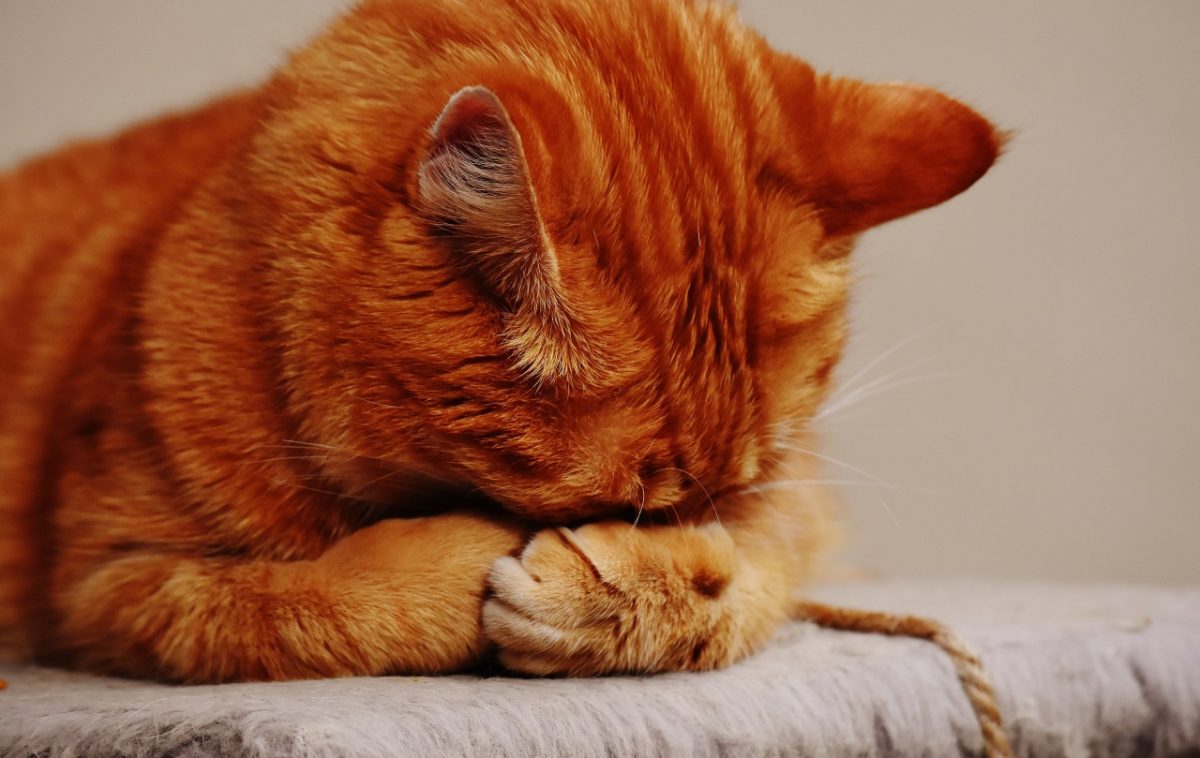
Cystitis: A Common Sign of Stress in Cats
Jan 26 2023.
A common sign of stress in cats is interstitial cystitis or inflammation of the bladder. This condition is also known as ‘feline idiopathic cystitis’, or FIC. Just like human cystitis, this condition can be excruciating for our furry friends. Below, Cat in a Flat looks into what owners should look out for if they think their kitty might be suffering, and how future flare-ups can be prevented.
While cystitis in female cats is distressing and uncomfortable, the condition can become life-threatening for tomcats. Male cats are susceptible to their bladder becoming blocked by swelling, blood clots or crystals. Blockages can lead to a cat being unable to pass urine, which leads to the bladder overfilling, which, in turn, causes back-pressure and can ultimately lead to kidney failure and collapse.
Table of contents
Any male cat that seems unable to pass urine should be seen by a veterinary surgeon immediately and checked for Feline lower urinary tract disease (FLUTD)

Causes of cystitis in cats
There are many possible causes of cystitis, but the majority of young cats who develop cystitis or urinary crystals do so as a result of stress. Sometimes the reason behind a kitty’s stress is apparent: during a house move, for example, or the arrival of a new pet. But often, the reason behind Mr Whisker’s distress is hard to define. Unfortunately, our cats can’t talk to us about what is wrong. So we need to pay attention to behavior and think hard about what might be the cause of the upset. Cats are creatures of habit and don’t like change. So, change to a cat’s routine or environment should be considered.
If your kitty gets stressed when you’re away, book at least two visits a day with your cat sitter. Ask your sitter to stick to your cat’s routine including feeding times, litter tray habits, playtime and cuddles. If your cat needs extra attention, you could also consider booking an overnight sitter while you’re away. Many owners also find plugging in a calming Feliway diffuser effective in keeping kitty stress-free. Just make sure to set it up a few weeks before you leave so it can take effect.
Symptoms of cystitis in cats to look out for
- Distress while urinating
- Urinating more frequently than normal
- Urinating outside of the litter box
- Straining when trying to urinate
- Producing little or no urine
- Blood in the urine
- Over-grooming, especially around the perineum, and if the cat’s behavior is becoming obsessive
If your furry friend is showing any of these symptoms, call your vet for advice. Please do not ignore the behavior in the hope that it will fix itself.

Can cat cystitis be prevented?
Although there is no direct cause, it’s essential that your cat eats a healthy PH balanced diet and drinks plenty of water. If your cat currently eats only dry food, try balancing it out with some wet food. You can also add a few spoonfuls of water to their wet food for extra hydration, or treat them to ‘soups’ of tuna or chicken in plenty of water (without salt). Make sure to brief your cat sitter on any of these dietary requirements if you’re going away.
Cats are notoriously bad at drinking water, so do everything you can to encourage them to stay hydrated. Keep cats’ drinking water away from their food. You could also invest in a water fountain as many cats prefer to drink from a moving water source. That is why a lot of kitties become so excited by a dripping tap! Many fountains also come with a filter to remove chemical smells from the water that offend our cats’ sensitive noses.
Obese cats are more prone to cystitis, so encouraging exercise and weight loss can help prevent future flare-ups. Indoor cats also seem to suffer from FIC more often, and this could be related to litter box use. Make your cat’s toilet area stress-free by keeping it in a quiet area and giving each kitty their own space. For more advice on litter box habits, read this article on the Cat in a Flat blog.
For warm summer days, here are some useful tips on how to keep your kitty hydrated and cool! =^.^=
PLEASE NOTE: Once cats have developed cystitis, they are very prone to having further bouts of it in the future. So please stay alert and make sure your cat sitter is aware of any previous conditions. Leave your vet’s details with your sitter, as well as the location of your cat carrier.
- #cat feeding
- #cat minder
- #catinaflat
- #catsitting
- #cystitis
- #house sitting
- #ill cat
- #litter box
- #litter tray
- #local pet sitter
- #pet care
- #pet sitting
- #pet travel
- #stressed cat
- #urine crystals
- Cat Care

